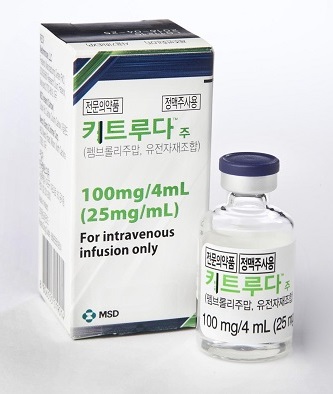MSD's anti-PD-1 immunotherapy Keytruda (pembrolizumab) has been approved for the first-line treatment of HER2-negative gastric cancer following BMS’s Opdivo (nivolumab).

MSD Korea said Monday that Keytruda received approval from the Ministry of Food and Drug Safety (MFDS) last Wednesday for an expanded indication for the first-line treatment of patients with inoperable locally progressive or metastatic HER2-negative gastric or gastroesophageal junction (GEJ) adenocarcinoma in combination with fluoropyrimidine and platinum-based chemotherapy.
With this indication expansion, Keytruda became the first immuno-oncology drug approved in Korea for treating all metastatic gastric cancer, HER2-positive and negative. Previously, Opdivo was the only first-line treatment for HER2-negative gastric cancer approved in Korea.
The indication expansion is based on KEYNOTE-859, a multicenter, double-blind, placebo-controlled, randomized, phase 3 study that enrolled 1,579 patients at 207 medical institutions in 33 countries. The primary endpoint was overall survival (OS), which was evaluated in the patients with the intention to treat (ITT) and showing PD-L1 CPS 1 or higher and 10 or higher.
At a median follow-up of 31 months, the Keytruda-antineoplastic chemotherapy combination therapy significantly improved OS in all patients, with a median OS of 12.9 months (95 percent CI 11.9-14.0) compared to 11.5 months (10.6-12.1) with chemotherapy alone, a 22 percent reduction in the risk of death (HR 0.78 [95 percent CI 0.70-0.87]; p<0.0001).
In patients with PD-L1 CPS 1 or higher, the median OS in the Keytruda combination arm was 13.0 months (95 percent CI 11.6-14.2), compared to 11.4 months (10.5-12.0) in the chemotherapy monotherapy arm (HR 0.74 [95 percent CI 0.65-0.84]; p<0.0001).
In addition, in patients with PD-L1 CPS 10 or higher, the Keytruda combination continued to demonstrate superior treatment benefit regardless of PD-L1 expression, with a median OS of 15.7 months (13.8-19.3) compared to 11.8 months (95 percent CI 10.3-12.7) in the chemotherapy monotherapy arm, and a 35 percent reduction in the risk of death (HR 0.65 [95 percent CI 0.53-0.79]; p<0.0001).
Besides, patients with PD-L1 CPS ≥1 and <10 also demonstrated significant clinical benefit, with an OS hazard ratio (HR) of 0.83 (95 percent CI 0.70-0.98) in the Keytruda combination arm.
The secondary endpoint of progression-free survival (PFS) was also significantly improved with the Keytruda combination compared to chemotherapy alone. Median PFS in the Keytruda combination arm was 6.9 months (95 percent CI 6.3-7.2) compared to 5.6 months (5.5-5.7) in the chemotherapy monotherapy arm, representing a 24 percent reduction in the risk of disease progression or death (HR=0.76 [95 percent CI 0.67-0.85]; p<0.0001).
Keytruda’s safety profile was similar to that observed in previously reported studies. The most common grade 3-5 adverse events, regardless of cause, were anemia (12 percent in the Keytruda combination arm vs. 10 percent in the chemotherapy monotherapy arm) and neutropenia (10 percent vs. 8 percent). Serious treatment-related adverse events occurred in 23 percent of patients in the Keytruda combination arm and 19 percent of patients in the chemotherapy monotherapy arm.
"Gastric cancer is a cancer with a high incidence in Korea and a high unmet need, with less than one in 10 patients surviving five years with distant metastases," said Professor Rha Sun-young of the Department of Medical Oncology at Yonsei Cancer Center and first author of the KEYNOTE-859 clinical study. “For HER2-negative gastric cancer, which accounts for about 80-90 percent of gastric cancers, unlike other cancers for which several immuno-oncology drugs are licensed, the treatment options are limited, and patients suffer greatly. This is why chemotherapy at the metastatic stage is crucial to improve patient survival."
Professor Rha went on to say, "The Keytruda combination therapy is highly recommended in major global guidelines, demonstrating clinical benefit over chemotherapy alone, not only in patients with PD-L1 expression but also in the overall patient population. We expect this indication expansion to further improve survival and outcomes for all patients with metastatic gastric cancer, given the superior treatment benefit in Asians compared to the overall population data presented at a major global conference."
Related articles
- GSK's Jemperli beats MSD's Keytruda to become 1st-line treatment for endometrial cancer in Korea
- Concern became a reality as Keytruda’s coverage expansion stalls
- Cancer panel approves Padcev but puts off Keytruda’s indication expansion
- Immunotherapy Keytruda gets additional indication for treating high-risk cervical cancer
- Keytruda’s coverage expansion effectively ‘shelved’

